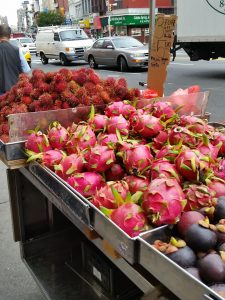By Lisa McMinn
“Here I am! I stand at the door and knock. If anyone hears my voice and opens the door, I will come in and eat with him and he with me.” I memorized Revelation 3:20 in third grade, probably for Pioneer Girls. I heard sermons about opening my heart’s door to Jesus and liked the paintings of Jesus standing in warm yellow lamplight, knocking on a wooden door. What I don’t remember is hearing much about the eating part.
While references to eating are sprinkled throughout the Bible like a solid dusting of powdered sugar over French toast, until recently I mostly missed them, and I doubt I’m the only one. My food has pretty much always been guaranteed, so food and eating references felt inconsequential for the most part; the main point was to get our souls in order. However, for those for whom food is not guaranteed, identifying with stories of harvests, feasts, sacrifices, drought, famine, and farming is more natural. Only recently have I come to see the deeply spiritual nature of food—physical, fragrant, savory food.
As it turns out, food is both a pleasure and our salvation. We need to eat to live, and either a plant or an animal needs to die so that we can go on living. But Jesus also sustains life now, not just because of what he did in the past but because he holds all creation together (Col. 1:17). Jesus comes to us, knocks on the door, and sits down for a meal—maybe spinach salad with hazelnuts, cranberries, and feta; butternut squash ravioli with pine nuts and sage browned butter; and apple strudel for dessert. Feeding his disciples was one of the first things Jesus did after the resurrection—a breakfast of roasted fish served on the seashore by the risen Rabbi.
Eating offers a pleasurable way of communing. Unlike our family cat, Pollifax, whose diet consists of raw field mice and dry cat food eaten alone (generally with efficient gusto), eating isn’t simply a functional pleasure. We are created with potential to enter each other’s lives as we break bread together, to give and receive and enjoy pleasure as we partake in food that keeps us alive. The mystery of communion is that we eat in order to live more fully. We eat with others, with Jesus in our midst, that we might live better, love better, and be grateful.
When Protestants speak of communion, they typically mean a ceremony where bread and wine (or grape juice) are eaten and sipped to remember Christ, who sacrificed all for us. Various traditions practice communion in different ways and emphasize different elements and purposes. My own religious tribe, the Quakers, observes the sacrament of communion during quiet communal worship every Sunday rather than with elements. We work to see all moments of life as sacramental—every meal as sacred time, an encounter with God. As an observant Quaker I fail at this; every meal does not, in fact, feel like communion.
It comforts me to remember that the possibility of sharing communion with God at each meal takes place more through God’s initiation than through my ability to make it happen. Therefore I embrace the practice, however feebly, because I want to be engulfed daily in God’s love and presence, mindful of my commitments and belongingness, my shortcomings and need for reconciliation. When I pay attention, I more easily remember that life is sustained by God’s daily grace and the sacrifices that bring me food.
Today’s post is excerpted from Lisa McMinn’s book To the Table: A Spirituality of Food, Farming, and Community. pp. 21-23, Brazos Press, a division of Baker Publishing Group (Used with permission)


2 comments
I, too, have heard plenty of sermons preached about Jesus knocking on the door to our hearts but have never heard someone keep going and talk about having a meal together. Thanks for sharing the book excerpt and opening my eyes to something that I hadn’t seen before.
Your welcome